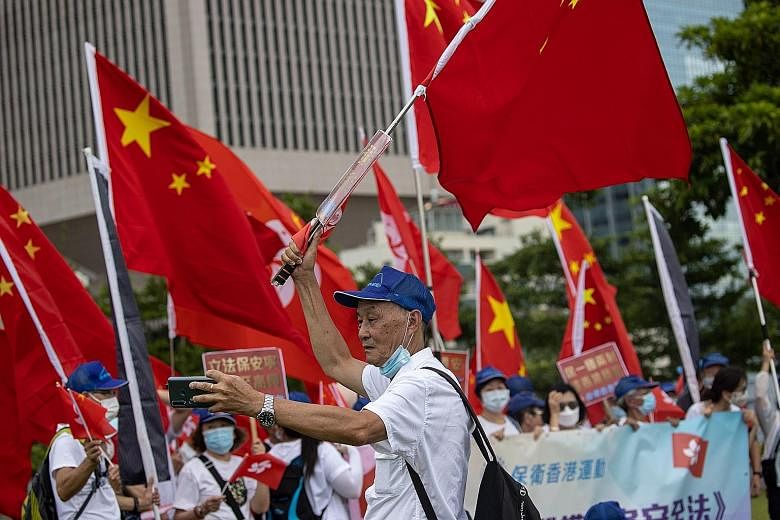Chinese President Xi Jinping yesterday signed into effect a Hong Kong national security law, which has been inserted into the city's mini-Constitution, state media reported.
Passed unanimously by China's top lawmaking body and bypassing Hong Kong's legislature, it took effect immediately. It effectively bans the sort of protests that have rocked the city for most of the past year, criminalising subversion and collusion with foreign forces.
"The (National People's Congress Standing Committee) meeting passed the (Hong Kong national security law), and President Xi Jinping signed presidential decree No. 49 for promulgation; the committee voted to insert the law into Annex III of the Basic Law of (Hong Kong)," said a report from the official Xinhua news agency.
For the few who try to endanger the security of Hong Kong, the law will be a "sword hanging over their heads", said the Hong Kong and Macau Affairs Office (HKMAO) in Beijing, adding that it would be a "protective talisman" for those who want peace and stability in the city.
"Do not underestimate the ability of Central and (Hong Kong) agencies to enforce the law strictly," Beijing's Hong Kong liaison office said in a statement. It added that no one should regard lightly the "steely constraints" of the law and that the central government is "fully prepared" for any situation that may arise during implementation.
The security law was promulgated into Hong Kong's Basic Law at 11pm yesterday, according to a notice issued on the Hong Kong Government Gazette. Footage from state broadcaster CCTV showed lawmakers voting just after 9am, and applauding when the law was passed.
While news of the law's passage broke in the Hong Kong media yesterday morning, the Chinese media was silent on the matter until the official announcement at 6pm, nearly nine hours later. It was then given prime coverage on the flagship evening news broadcast, with nearly 20 minutes devoted to the topic.
The media disparity is a manifestation of the "one country, two systems" principle by which former British colony Hong Kong has been governed since its handover to China in 1997. Yet there are concerns that Hong Kong's liberties - such as a free press and free speech, which are unseen in the mainland - will dissipate with the law's passage as Beijing tightens its grip.
Since it was first proposed at the start of China's annual parliamentary meetings in May, the law has gone through a truncated legislative process and was passed in just over 40 days.
The national security law will be a "new start" for Hong Kong, the nationalistic Global Times tabloid wrote in an editorial, but there will still be struggles.
"Chinese society, including Hong Kong society, must be prepared to support the enforcement of the law... to punish a few diehards who have been committed to jeopardising national security, and to fight some tough battles against US interference in Hong Kong," it wrote.

A new national security agency, reporting directly to Beijing, will be set up under the ambit of the new law, while a national security committee chaired by the Hong Kong Chief Executive will be set up to implement the law.
But the legislation's passage has been met with strong resistance by Western governments and the pro-democracy camp in Hong Kong, who say it represents an end to "one country, two systems".
According to details of a draft released two weeks ago, the law will ban secession, subversion, terrorism and collusion with foreign forces to harm national security.
Beijing has been infuriated by protests that have rocked Hong Kong for nearly a year, insisting it is the work of foreign forces.
But Hong Kongers say the protests, which have often resulted in violent street battles between demonstrators and police, is a result of simmering anger at the government.
Key provisions of the new law
OFFENCES
Secession, subversion, terrorism and colluding with foreign forces will all be criminal offences. Most carry three-to 10-year prison sentences but "serious offences" can be punished with life imprisonment. Those found guilty of any of the offences will also be barred from taking part in any Hong Kong election.
The national security law would also apply to "organisations", which include companies or groups. It can also be applied to anyone outside Hong Kong found to threaten the territory's national security.
NATIONAL SECURITY DEPARTMENT
A "national security department", set up by the Hong Kong Police Force, may hire "qualified technicians and specialists from outside Hong Kong" to assist in national security.
This would mean that mainland Chinese individuals can be a part of the department, which is different from the National Security Agency.
NATIONAL SECURITY AGENCY
The agency's personnel will be "dispatched by the relevant organs" of the Central Government in Beijing, the law states.
This means that mainland agents can be deployed and stationed in Hong Kong, much like how the Hong Kong garrison of the People's Liberation Army operates.
This unit will work with the arm of the foreign ministry in Hong Kong to "strengthen the management of foreign and international organisations", foreign missions, and the management of foreign non-governmental organisations and news agencies.
COURTS AND JUDGES
While the law is meant to follow Hong Kong's legal procedures, specific judges at all levels must be appointed to deal with national security cases.
Their term would be renewed every year.
"Anyone who speaks and acts in ways that endanger national security shall not be designated as a judge that hears crimes dealing with national security," the law said.

